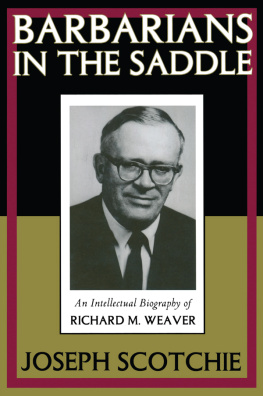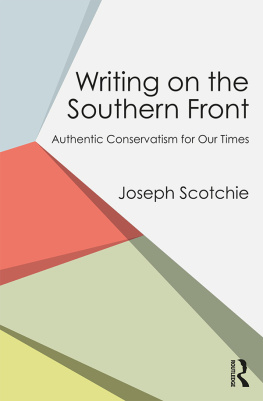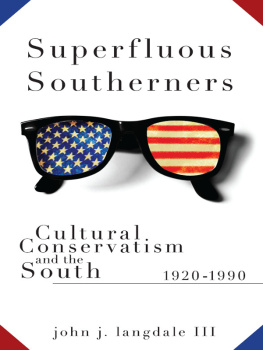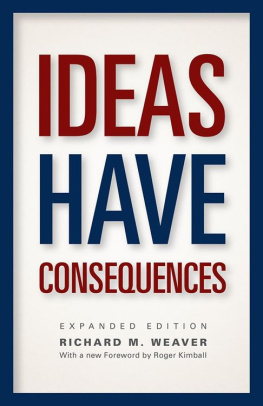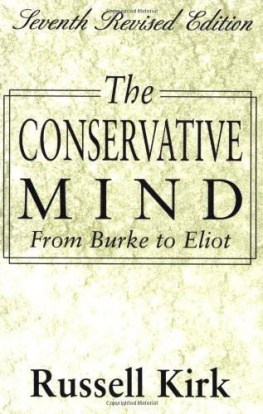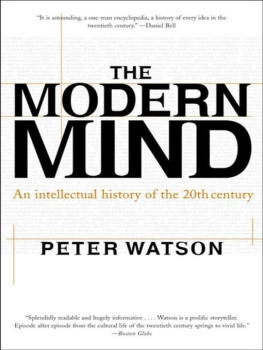BARBARIANS IN THE SADDLE
First published 1997 by Transaction Publishers
Published 2019 by Routledge
2 Park Square, Milton Park, Abingdon, Oxon OX14 4RN
52 Vanderbilt Avenue, New York, NY 10017
First issued in paperback 2019
Routledge is an imprint of the Taylor & Francis Group, an informa business
Copyright 1997 Taylor & Francis
All rights reserved. No part of this book may be reprinted or reproduced or utilised in any form or by any electronic, mechanical, or other means, now known or hereafter invented, including photocopying and recording, or in any information storage or retrieval system, without permission in writing from the publishers.
Notice:
Product or corporate names may be trademarks or registered trademarks, and are used only for identification and explanation without intent to infringe.
Library of Congress Catalog Number: 97-16718
Library of Congress Cataloging-in-Publication Data
Scotchie, Joseph, 1956-
Barbarians in the saddle : an intellectual biography of Richard M.
Weaver / Joseph Scotchie.
p. cm.
Includes bibliographical references and index.
ISBN 1-56000-321-9 (alk. paper)
1. Weaver, Richard M., 1910-1963. 2. Politics and literature
United StatesHistory20th century. 3. ConservatismUnited
StatesHistory20th century. 4. United StatesIntellectual
life20th century. 5. CriticismUnited StatesHistory20th
century. 6. Civilization, Modern20th century. 7. Southern
StatesCivilization. 8. Civilization, Western. 9. Rhetoric
Philosophy. I. Title
PS29.W43S36 1997
814.54dc21
97-16718
CIP
ISBN 13: 978-1-138-50752-4 (pbk)
ISBN 13: 978-1-56000-321-2 (hbk)
Thanks to Polly Weaver Beaton, sister of Richard Weaver and Josephine Osborne, cousin of Richard Weaver for biographical information. Thanks also to Professor Ted J. Smith III and Mr. Louis Dehmlow for other insights into Weavers life and career. Much of the bibliography was gleaned from an earlier work prepared by Paul Vamell from the 1968 Arlington House edition of The Southern Tradition at Bay (now out of print). The Special Collections section of the Jean and Alexander Heard Library at Vanderbilt University, Nashville, Tenn. has the most extensive collection of Weaver papers and letters. Michael Sims, an employee at that library provided information for the chronology. Most of all, thanks to my wife Anna for the research, proofreading, and for believing in this project when the author held far less confidence in it.
Excerpts from Ideas Have Consequences reprinted with permission of the University of Chicago Press, Chicago Illinois; from The Ethics of Rhetoric, with permission from the Hermagorus Press, Davis, California; from Visions of Order with permission from Intercollegiate Studies Institute Inc., Wilmington, Delaware. From The Southern Tradition at Bay. Copyright 1990 by Richard Weaver. All rights reserved. Reprinted by special permission of Regency Publishing, Inc., Washington, D.C.
March 3, 1910. Born in Asheville, N.C. Lived in Weaverville, North Carolina.
1916. Family moved to Lexington, Kentucky.
19271932. Attended University of Kentucky. Member of Phi Beta Kappa. Received A.B. degree.
19331936. Attended Vanderbilt University. Was a teaching fellow. Received masters in English.
19361937. Instructor in English at Alabama Polytechnic Institute.
19371940. Acting assistant professor at Texas A & M.
19401943. Student at Louisiana State University where he worked with Cleanth Brooks and Robert Penn Warren. Summer sessions at the Sorbonne, Harvard University, and the University of Virginia.
1943. Received Ph.d from Louisiana State University.
19441963. Professor of English at the University of Chicago.
1948. Ideas Have Consequences.
1949. Won University of Chicago Quantrell Award for excellence in undergraduate teaching.
1953. The Ethics of Rhetoric.
1955. Russell Kirk establishes Modern Age. Weaver writes the inaguaral numbers first essay, Life without Prejudice.
1957. Composition: A Course in Writing and Rhetoric.
1958. Participant in Vanderbilt University Literary Symposium.
1962. Recieved Young Americans for Freedom Award at a rally in New Yorks Madison Square Garden. Inscription reads for service to education and the philosophy of a free society.
April 9, 1963. Died in Chicago, Illinois.
1964. Visions of Order. Richard M. Weaver Fellowships established by Intercollegiate Studies Institute.
1965. Life Without Prejudice and Other Essays.
1968. The Southern Tradition at Bay.
1970. Language is Sermonic.
1983. The Rockford Institute, Rockford, 111., establishes the annual Richard M. Weaver Award for Scholarly Letters.
1985. The Ethics of Rhetoric reissued by Hermagoras Press.
1987. The Southern Essays of Richard M. Weaver.
1989. The Southern Tradition at Bay reissued by Regnery/Gateway.
1995. Visions of Order reissued by Intercollegiate Studies Institute.
The purpose of this book is to introduce the reader to the works of Richard M. Weaver. Our subject is associated with two well-known twentieth-century intellectual developments, the Southern Agrarian literary movement and the post-World War II conservative reaction to the statism of the New Deal. The former came into being primarily through the 1930 publication of famous Agrarian manifesto, Ill Take My Stand. Weaver studied at Vanderbilt under John Crowe Ransom in the early 1930s, when Agrarianism was still a promising force. Although his stay at Vanderbilt did not fully bring him around to agrarianism, he was committed to traditionalism by the early 1940s, when he wrote his Ph.D thesis (later published as The Southern Tradition At Bay) at Louisiana State University under the direction of Cleanth Brooks. A string of cogent and well-argued essays about Southern culture and literature in the 1950s gave Weaver his well-earned identification with the Agrarians.
While Weaver was a leading disciple of the Agrarians, he was also an important philosopher of the postwar conservative intellectual movement. That spirited opposition to the triumph of statism in American and Europe was launched in part by Weavers 1948 book, Ideas Have Consequences. Historians identify Weaver, along with Austrain economists Friedrich A. Hayek and Ludwig Von Mises, Russell Kirk, Whittaker Chambers, and James Burnham as the intellectual founders of a movement that had three main focuses: The libertarian economist wing (Hayek and Von Mises), a strong anticommunist ideology (Chambers and Burnham), and the traditionalist wing. Weaver, along with Kirk, is widely recognized as the founder of the traditionalist element of modern conservatisma philosophy concerned with preserving ancient Western traditions and pieties amidst the enormous changes and pressures brought on modern society by the forces of technology, industrialism, and the rapid urbanization of the hithero agrarian American republic.
Weaver remains a revered figure to the remnants of the Old Right. In the 1960s, the Intercollegiate Studies Institute established fellowship awards in Weavers name to students interested in pursuing graduate studies. And in 1983, the Rockford Institute accorded Weaver its highest honor, establishing, in his name, the annual Ingersoll award for scholarly letters. The institute also confers the T.S. Eliot Award for Creative Writing. By being elevated to the same level as one of the centurys most famous and revered literary figures, Weaver was finally given proper recognition as an important thinker in his own right. Winners of the Richard M. Weaver Award for Scholarly Letters have included Kirk, Andrew Lytle, Robert Nisbet, John Lukacs, Edward Shils, Forrest MacDonald, and Eugene Genovese.

